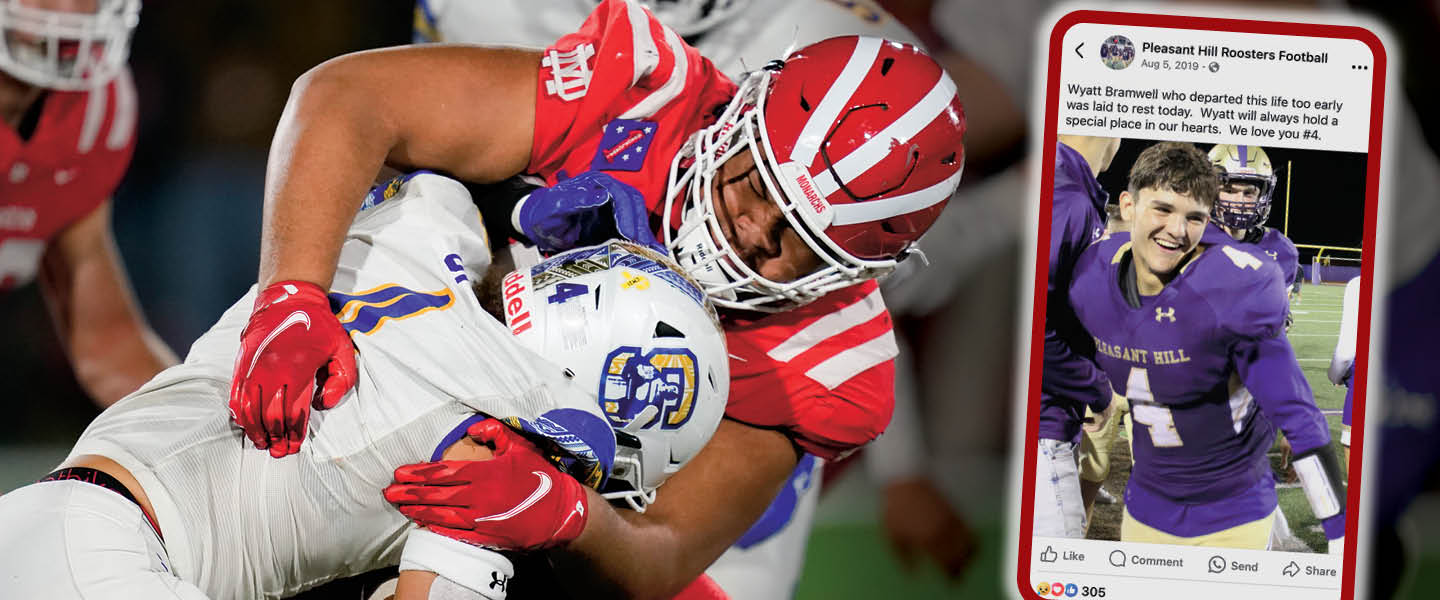Wyatt Bramwell dreamed of playing football at the University of Missouri and in the N.F.L. He started young—flag football in kindergarten and tackle football in third grade.
But in the months before his death in 2019, at age 18, Wyatt’s behavior started to change. He could be angry and unpredictable—“unrecognizable,” says his father, Bill Bramwell. “And unfortunately, we couldn’t recognize possibly what was happening with him until it was too late.”
One day, Wyatt sat in his car and recorded a video message for his parents.
“I’ve been depressed for a long time,” he said. “My head is pretty messed up and damaged.” And he attributed his suffering to the game he loved. “I took a lot of hits through football. A lot of hits through football. I took a lot of concussions. And a lot of times I never told anybody how I was feeling in my head after a hit. I kind of just kept playing.”
Minutes later, Wyatt took his own life.
His dad and mom, Christie Bramwell, have since learned that their son suffered from advanced C.T.E.—chronic traumatic encephalopathy—a degenerative brain disease that research has linked to repeated hits to the head (see “What Is C.T.E.?,” below). And they’re not alone among families of young athletes.
Wyatt and 151 other young contact-sport athletes, both men and women, were part of a recent study at Boston University (B.U.), the first of its kind on C.T.E. in athletes who died before turning 30. Like the other families who participated, Wyatt’s parents donated their son’s brain. Of the 152 athletes studied, 63—more than 40 percent—had C.T.E. Of those, 48 played football, most of them at no higher than the high school or college level. The main sports for the other athletes who had C.T.E. included hockey, soccer, and wrestling.
Researchers conducted the study as part of a larger one at B.U. that also identified more than a hundred deceased former N.F.L. players who had C.T.E.
The growing body of knowledge about what contact sports can do to the brain has presented many parents with a difficult choice of whether or not to let their children participate.
“There’s a lot of [misconceptions] around youth tackle football,” Bill Bramwell says. “‘If you don’t start them soon enough, they’re going to get left behind. Then are they going to be as competitive?’ Full disclosure: I bought into some of that.”
Wyatt Bramwell was young when he started playing football: flag football in kindergarten and tackle football in third grade.
He dreamed of playing for the University of Missouri and in the N.F.L.
But in the months before his death in 2019, at age 18, Wyatt’s behavior started to change. He could be angry and unpredictable—“unrecognizable,” says his father, Bill Bramwell. “And unfortunately, we couldn’t recognize possibly what was happening with him until it was too late.”
One day, Wyatt recorded a video message for his parents.
“I’ve been depressed for a long time,” he said. “My head is pretty messed up and damaged.”
He blamed his suffering on the game he loved. “I took a lot of hits through football. A lot of hits through football. I took a lot of concussions. And a lot of times I never told anybody how I was feeling in my head after a hit. I kind of just kept playing.”
Minutes later, Wyatt took his own life.
His parents have since learned that their son suffered from advanced C.T.E.—chronic traumatic encephalopathy. It’s a degenerative brain disease that research has linked to repeated hits to the head (see “What Is C.T.E.?”).
Wyatt and 151 other young contact-sport athletes, both men and women, were part of a recent study at Boston University (B.U.). It was the first of its kind on C.T.E. in athletes who died before turning 30. Like the other families who participated, Wyatt’s parents donated their son’s brain. Of the 152 athletes studied, 63—more than 40 percent—had C.T.E. Of those, 48 played football, most of them at no higher than the high school or college level. The main sports for the other athletes who had C.T.E. included hockey, soccer, and wrestling.
Researchers conducted the study as part of a larger one at B.U. that also identified more than a hundred deceased former N.F.L. players who had C.T.E.
The growing body of knowledge about what contact sports can do to the brain has presented many parents with a difficult choice: Should they let their children participate in contact sports?
“There’s a lot of [misconceptions] around youth tackle football,” Bill Bramwell says. “‘If you don’t start them soon enough, they’re going to get left behind. Then are they going to be as competitive?’ Full disclosure: I bought into some of that.”

